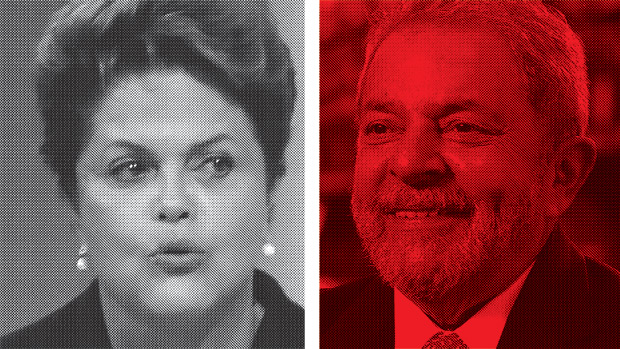The two sides of the same problem
Intrigue, threats, treason, corruption. The struggle for power within the Workers Party (PT) exposes an unparalleled split in the history of the party that may put the re-election of President Dilma Rousseff at risk

Ex-President Lula
President Dilma Rousseff
President Dilma Rousseff is facing a moment of weakness like never before. Besides facing problems related to the economy, such as low growth, stubborn inflation and the dismantling of the electricity sector, she has lost popular support and no longer has the strength to prevent initiatives in Congress that could harm her image. The government´s approval rating has fallen to a level that specialists say threatens the re-election. Allied parties have suspended negotiations to support her in the electoral race. The opposition representatives have won a legal ruling to set up a Congressional Investigation Committee (local acronym CPI) to examine a scandal involving the state-owned oil company Petrobras exclusively. Rousseff is cornered and needs the PT´s help more than ever but this assistance is being denied. Powerful factions within the PT are taking advantage of the unfavorable outlook for her and calling for Lula to become the party´s candidate for the Planalto Palace and are conspiring against the President. The aim is clear: to restore powers and budgets that were removed from them by Rousseff herself. Six months from the election, the PT is split between supporters of Lula and Rousseff. For the more pragmatic comrades, this division and not the threats from rivals such as Aécio Neves (PSDB) and Eduardo Campos (PSB), represents the greatest threat to the party´s power project.
Rousseff´s political career was built in the resistance to the military dictatorship and later with the PDT party so she has never had a PT soul. On becoming President she inherited a large part of the administration of Lula government, such as ministers, state-owned company directors and even the chief of staff of the President´s office in São Paulo, Rosemary
Noronha. Her government was one of continuity, even in the names chosen to run the country. Her plan was to give her administration her own touch in a gradual way, reducing the influence of her predecessor over time. Antonio Palocci, her first chief of staff, summed up the strategy: “In the first year of her mandate, it will be a Lula-Dilma government. In the second, a Dilma-Lula government. And in the third, it will be a Dilma-Dilma government”. However, this timetable was overturned by events. In 2011, the President was forced to fire six ministers, four of them from the previous government, accused of corruption and abusing their influence. She proved to be intransigent with the wrongdoers in contrast to Lula who used to defend politicians bogged down in irregularities. This ethical cleansing, as it was known, brought Rousseff record levels of popularity and gave her the strength to remove strategic sectors of her government from the well-known corrupt schemes run by the political parties. Not even the PT was spared in this offensive.
The party lost ground in administering pension funds and Petrobras, the executive management of which was changed in 2012. The ethical cleansing was accompanied by moves to make the management more professional. These changes led many PT leaders to lose influence. These included José Dirceu, Lula´s former chief of staff who is currently in prison for his role in the bribes-for-votes scandal known as the “mensalão”. There was a growing estrangement between the President and the party machine but Lula kept the PT united and quiet. He claimed that the “conservative media” — by cheering on the firings made by his successor, with the clear intention of attacking him — was helping Rousseff to win over electors who were historically averse to the PT and the comparison between him and her was actually benefiting the party. If some PT members were damaged in isolated cases, the party as a whole was strengthened. This view kept the rank and file under control until 2013 when the President´s popularity rating fell due to inflation and the popular demonstrations in June. PT members then started to criticize Rousseff and conspire against her in Congress and call for Lula to be the candidate. The internal split was starting to form but was still at a budding stage and kept behind the scenes. This dike was broken by the Petrobras scandal.
The PT is currently witnessing a bloody public battle between the soldiers of the two Presidents. Palocci did not foresee that the last year of her mandate would also have its epithet: the Rousseff versus Lula government. The war was declared after the President said that she had voted in favor of the purchase of the Pasadena oil refinery in the United States based on a “faulty” report drawn up by the former Petrobras executive board. Lula did not like what he heard and regarded Rousseff ´s sincerity as a political error, by taking the problem inside the Planalto, and an act of disloyalty by blaming him for the loss of the operation. Rousseff told allies that she was uncomfortable with the fact that her predecessor, who always plays the role of a fireman in times of crisis, had not appeared on the field to help her douse the flames. It was to resolve these differences that the two of them met in São Paulo to talk. On that occasion, they decided to fine tune the speech and bury the Congressional investigation into Petrobras. However, they did not tell their respective infantries about the strategy. In a statement to the Senate, Graça Foster, the Petrobras CEO nominated by Rousseff, said that the purchase of the refinery was a “bad deal”. The shooting restarted immediately.
Graça Foster´s predecessor, José Sergio Gabrielli of the PT, who was nominated by Lula, went on the attack: “Dilma cannot escape from her responsibility,” he said. As is well known, Rousseff was chairman of the Board of Directors of Petrobras when the operation was approved. After making this public retaliation, Gabrielli added a threat. He told PT members that Rousseff had taken part in “various meetings in the Planalto Palace” on the subject when she was one of Lula´s ministers and had always supported the acquisition of the Pasadena refinery. Gabrielli implied that this version could be transmitted to the Congressmen should he be invited to testify again, which occurred last week. “Gabrielli´s reaction was basically political, in defense of the previous government. He and Lula are annoyed,” said a PT senator. Part of the PT decided to react because it feels that, as part of a public relations offensive, Rousseff is trying to split the party into two bands: a “republican” side which supports her and a “rotten” side made up of allies of the former President. This is not a new strategy and would explain Rousseff´s lack of solidarity with those imprisoned members of the PT involved in the “mensalão” scheme. However, the strategy has gained breathing space now when she needs to recover her popularity.
The idea of crushing the “rotten” band would also be seen in the case of Congressman André Vargas who faces proceedings by the House of Representatives Ethics Committee due to his relationship with the currency trader Alberto Youssef who is in prison accused of running a billion dollar money laundering scheme. Rui Falcão, the president of the PT and an ally of Rousseff, is putting pressure on Vargas to resign his mandate. Falcão wants to end the case to prevent further damage to the President´s candidature for re-election and those important members of the PT who are candidates for state governerships. Vargas is resisting and accusing the government of leaking information to destroy him politically only because he is a leader of the movement that wants Lula to return, the “Come back Lula” campaign. “Dilma is treating us like a rotten band. We will react,” said Congressman José Mentor (PT-SP) to his parliamentary colleagues. This band is formed by groups that enjoyed greater prestige in the previous government and it is not joking when it promises to open friendly fire. Congressman Cândido Vaccarezza, who was fired as leader of the government by Rousseff, went to the Planalto Palace to warn that he would not allow any leaks to be made against him. Vaccarezza also said he was ready to face a long battle if he was attacked. It looks as though the Congressman was aware of what was about to appear.
When pressed to resign, Vargas threatened to open a box of tricks against the communications minister Paulo Bernardo and the PT candidates for the governorships of Paraná and São Paulo states, Gleisi Hoffmann and Alexandre Padilha, respectively. Not only could the “rotten” band retaliate but it is also working to elect an ally, Congressman Luiz Sérgio, as the vice-president of the House of Representatives. Naturally, the government is trying to find another name for the position. Lula knows that the speculation over his return and the battles between the PT groups is threatening Rousseff´s re-election. The former President is adamant that he will not be a candidate again this year. Should this candidature occur, it would be extremely risky and represent a stab in the back for his successor. For example, how could he explain the change of names on the ballot paper without giving the impression that Rousseff had been an administrative failure or an electoral fraud?
If, in one hand, Lula rejects the possibility of standing in the presidential election, he also criticizes Rousseff in off-the-record conversations, weakening her in front of intermediaries. The former president often says that Dilma unnecessarily confronts Congressmen and does not negotiate measures in the economic area. By doing so, he echoes the accusations of interventionism and authoritarianism that weigh against her. “Lula says that he only receives complaints about Rousseff,” said Congressman William Dib (PSDB-SP), who spoke to him at a wedding in São Bernardo last month. Dib is former mayor of the town who broke with the PSDB governor, Geraldo Alckmin, and will support the PT´s Padilha in the state election. “Lula is concerned because Dilma has a lot of problems,” said João Inocentini, chairman of the National Union of Pensioners who also spoke recently to the ex-President. “However, he thinks there is not much time to change candidates. If it was in last December or January…” The Lula´s supporters are basically split into two groups. One of them still nurtures the hope that he will get rid of Rousseff and stand in the presidential election. This is a minority group. Another one wants to distance itself from her so it can gain political ground and show her that it is better to have its members as allies and preferably give them access to the benefits of power. “Lula really wants the re-election of a weak Dilma which would give him a privileged position in her second mandate,” said a pro-Lula Congressman.
Judge Rosa Weber of the Supreme Federal Court (STF) ruled last week that a Congressional Investigation Committee should be set up immediately to investigate Petrobras exclusively. This decision was a blow to the government that wanted to include other targets for the committee to investigate, including the São Paulo metro cartel and the activities at Porto de Suape as a means of attacking the PT´s rivals in the presidential dispute. PT members decided not to appeal against the STF decision to avoid any further harm or exposure to public opinion. The order now is to control how the committee works and reach an armistice between the Lula and Rousseff supporters. A small group of firemen, known for their pragmatism, is calling on the good old-fashioned survival instinct and pointing to internal surveys that show a fall in voting intentions for PT candidates in a number of states. The argument is simple: the “rotten” band could even overthrow the “republican” band and vice-versa but there is a real risk that the PT will lose power in the polling booths. Congressman José Guimarães, vice-president of the party and deputy leader of the government said: “Together Lula, Dilma and the PT will win but if they separate and split, we will lose”.
Mini manual of the guerrilla in the internet

EASTER OF ENGAGEMENT – The Camping Digital event that was paid for by the PT brought together 2,000 people to teach them how to ridicule the party´s adversaries and “outwit “the NSA”
In the 1960s the terrorist Carlos Marighella wrote a small book that was a bible for thousands of deluded souls who dreamt of overthrowing the military dictatorship by force of arms. The Minimanual do Guerrilheiro Urbano (The Urban Guerrilla Mini Manual) showed how to carry out ambushes and defended the summary execution of enemies. More than 50 years later, Brazil´s militant leftists are preparing for another battle. Around 2,000 members of the Workers Party (PT) met at an event called Camping Digital held during the Easter holiday in São José dos Campos in São Paulo state. The aim was to update those present in the art of guerrilla warfare through the Internet. The party footed the bill for the event which cost R$ 400,000.
The speakers were some of the PT´s main web supporters — bloggers and employees of sites financed by government announcements and companies run by the party. Along with the “strategists” of the game which is not always played fairly on the social networks, they taught the best means of attacking their adversaries and publicizing their accusations — a kind of Guerilla Mini Manual on the Internet.
One of the main tactics recommended to the audience was the creation and spread of “memes” — videos, images or phrases that are marked by good humor and spread quickly through the Internet. In this case, the aim is to benefit the PT or deride its adversaries. Leila Farkas, who is responsible for the web page of São Paulo mayor Fernando Haddad, said: “A single image can be used to exploit anything. You take any picture and give it any meaning you want. Isn´t that great?” One example she gave is already circulating on the web: a photo in which São Paulo governor Geraldo Alckmin is making a sign with his hands to indicate something small. “You can use it for anything: the low level of the Cantareira water reservoir, teacher´s pay, police pay…”, she explained. Another speaker, Tais Krug, defended a meme that linked a picture of the PSDB candidate for the presidency, Aécio Neves, to photos of drinks. The post has been removed from Facebook but she did not agree with the decision. “What´s offensive about that?”
In the lesson on profile management, the speakers´ advice was not to write only about politics as this could put readers off. The PT member in the web should work with popular subjects, which could include Valesca Popozuda (a Brazilian celebrity), Michael Jackson and any “other subject people like,” said Kátia Figueira, who looks after social medias for a company that creates sites. Another guideline passed by the party to the digital guerrilla apprentices was to get rid of pages with references to the “come back, Lula” campaign. Kátia said: “This creates the impression that the party believes the Dilma government has not worked out”.
Some of the speakers spoke about cryptography techniques, a resource used to prevent access to the content of messages and recommended “outwitting the NSA”, the American National Security Agency. “If they want to monitor our e-mails, they will have to spend more money to do so,” said Tiago Pimentel, from a NGO that favors “anonymous navigation”.
Another strategy suggested by the PT in the electoral fight on Brazilian soil is to interfere in political discussions between non- members to support the group that is most favorable to the party. If an anti-PT argument wins in a post on a social network, for example, the counter attack is to give a thumbs-up to all the posts with pro-PT ideas. Sociologist and “free software supporter” Clareana Cunha said: “Anybody from the outside looking in would get the idea that the leftist view was more accepted”.
At the same time, attacks should never be allowed to get away unquestioned. Altamiro Borges, who runs the Blog do Miro (“against media dictatorship”), said more cases of corruption were likely to appear up to the elections and PT supporters should not be “unarmed” . “If you fool around, you will lose the election”. The PT may even lose but the digital guerrillas promise to die fighting.



 SEGUIR
SEGUIR
 SEGUINDO
SEGUINDO

 Copa do Mundo de Clubes: os times brasileiros que serão eliminados nas oitavas, segundo sites de apostas e IA
Copa do Mundo de Clubes: os times brasileiros que serão eliminados nas oitavas, segundo sites de apostas e IA Vem chuva aí: os estados que serão mais afetados nesta sexta, 27, segundo o Inmet
Vem chuva aí: os estados que serão mais afetados nesta sexta, 27, segundo o Inmet Os sinais que levantaram suspeitas de separação de Amado Batista
Os sinais que levantaram suspeitas de separação de Amado Batista O climão entre jornalista brasileiro e deputado dos EUA sobre ‘ditadura’ de Moraes
O climão entre jornalista brasileiro e deputado dos EUA sobre ‘ditadura’ de Moraes Como era a vida de brasileira antes de viagem à Indonésia
Como era a vida de brasileira antes de viagem à Indonésia







